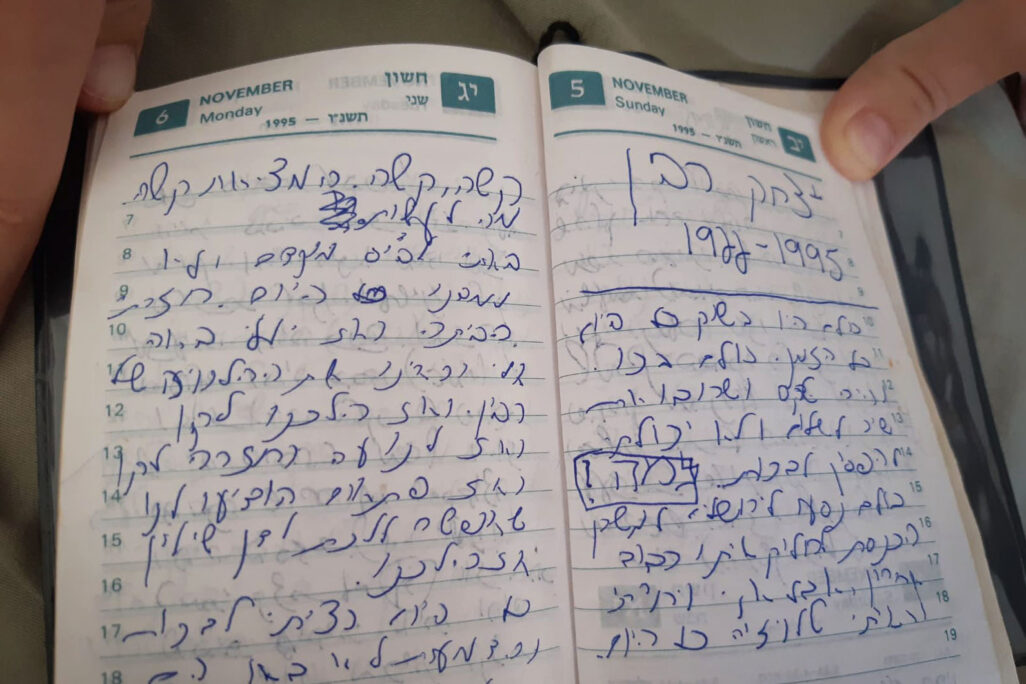
Tzachor was 16, Liebs was 25, Lipo was 23, and Teltsh was 47 years old when Israeli Prime Minister Itzhak Rabin was assassinated by Yigal Amir on November 5th, 1995. The shock and despair of the night of the murder touched each one of them in a different way. The following excerpts from their diaries and letters written in November 1995, present a personal perspective on a traumatic national event. Each one also reflects today on their writing from 25 years ago.
Gali Tzachor
In 1995, Tzachor was a 16 years old youth leader in the Herzliya ken (chapter) of the youth movement HaNoar HaOved v’HaLomed (NOAL). The following excerpt is taken from her personal diary.
Nov. 3 1995 – Yaeli and Noa slept over.
Nov. 4 1995, Shabbat – In the morning, we went with NOAL to the amusement park and it was really great. I met up with my whole friend group. And then we went to the peace rally and it was amazing and exciting. And then the 12th graders showed up.
And then “Shir l’Shalom” [A Song for Peace] came on and it was so moving, to tears. I whispered to Yaeli, “Look at Rabin, what a cutie!” At that moment in my life, I admired him as a person.
We went to get on the bus, and they said something had happened. When we got on the bus, we heard on the radio that there had been shots, and the whole bus just cried. And with every new update, like his spinal cord had been injured, or an eyewitness saying how he suddenly crumpled, the crying intensified. When I got home, I understood that he had died. And I cried so much.
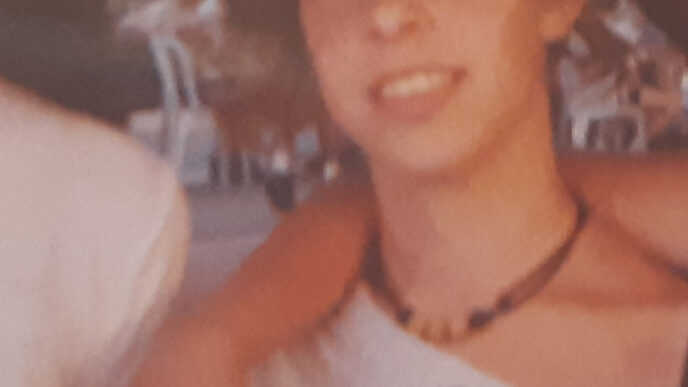
Nov. 5 – Itzhak Rabin 1922-1995
Today, everyone was in shock. Everyone cried. There was a ceremony and they sang Shir L’Shalom and I couldn’t stop crying. Why?
Everyone travelled to Jerusalem to the Knesset to pay their last respects, but I didn’t feel like it and just watched TV all day
Nov. 6 –
Reality feels so hard. I came to school early and we didn’t learn anything all day. I went home. Yaeli came over and we watched the funeral together. After, I went to the ken and then to Noa’s house and then back to the ken, and then they told us we could go watch [television host] Dan Shilon, so we went. All day I felt like crying but the tears wouldn’t come. They probably dried up at some point yesterday.
25 years later: Gali Tzachor (40), mother of three, is the educational director at the Center for Educational Leadership, in the Content and Programs Division of the Education Ministry. This year, she planned the Ministry of Education’s programming for the 25th Day of Remembrance of Rabin’s assassination.
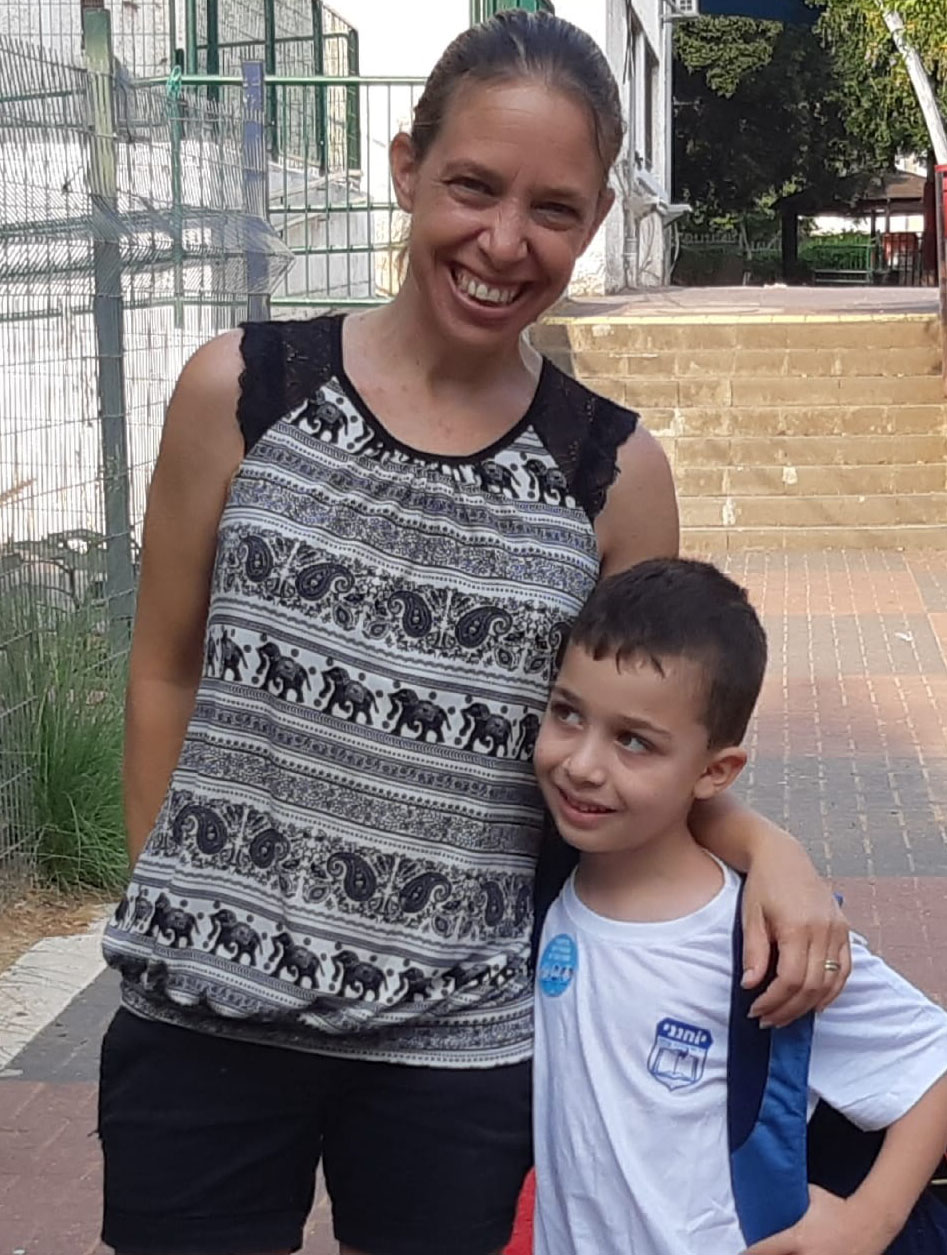
"On first reading it, I thought, how stupid that what I was interested in was who showed up or didn’t show up, what does it matter that we cried a lot or not. Reading it a second time, I brought myself back to that time, to that week. The personal and public feelings were mixed together. We knew we were part of history. Years later, I heard the voices of other youth in those days, the anger and the devastation – these feelings were expressed in what is written in my diary.”
Tamari Slonim Liebs
In 1995, Liebs, 25 years old and living in Ramat Gan, working as a fashion designer at the Lifti Textile Factory. The following excerpt is taken from her personal diary.
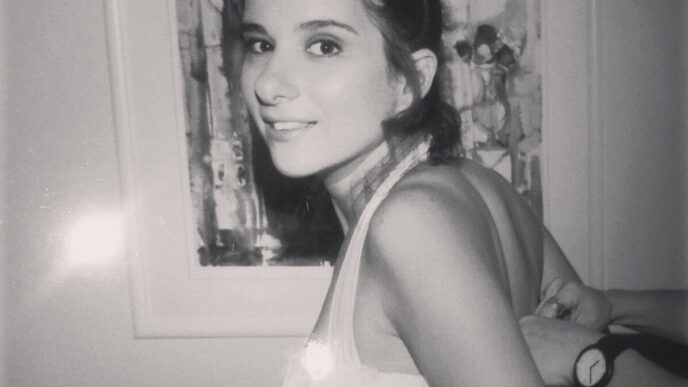
Nov. 5, 1995
I fed the cats. One cat looks bad after giving birth, very tired. She's curled up in the grass. It’s chilly today. The kittens are really cute. They are all white and one is mixed-colors. I think that animals feel everything. Like children.
I didn’t go to work today, I told A that I’m not coming. He wasn’t happy about that as usual, but I don’t care. My parrots are chirping all the time, I put a blanket on their cage, I need quiet.
Something good came out of today. I’m finally organizing my binders with all the recipes I had floating around on slips of paper. I’ve planned to do this for so long and didn’t have time. I’m at work all the time.
Two binders for sweet and one for salty.
I made illustrations for salty recipes and for the sweet ones as well. So it will be easy to remember using the illustration.
It’s what’s keeping me busy this morning, otherwise I would be going crazy. And I also turned off the radio because this sadness is too sad for me. And I cried today. Suddenly it doesn't matter what you believe in, or who and when. Suddenly nothing matters anymore.”
Why am I even writing this.
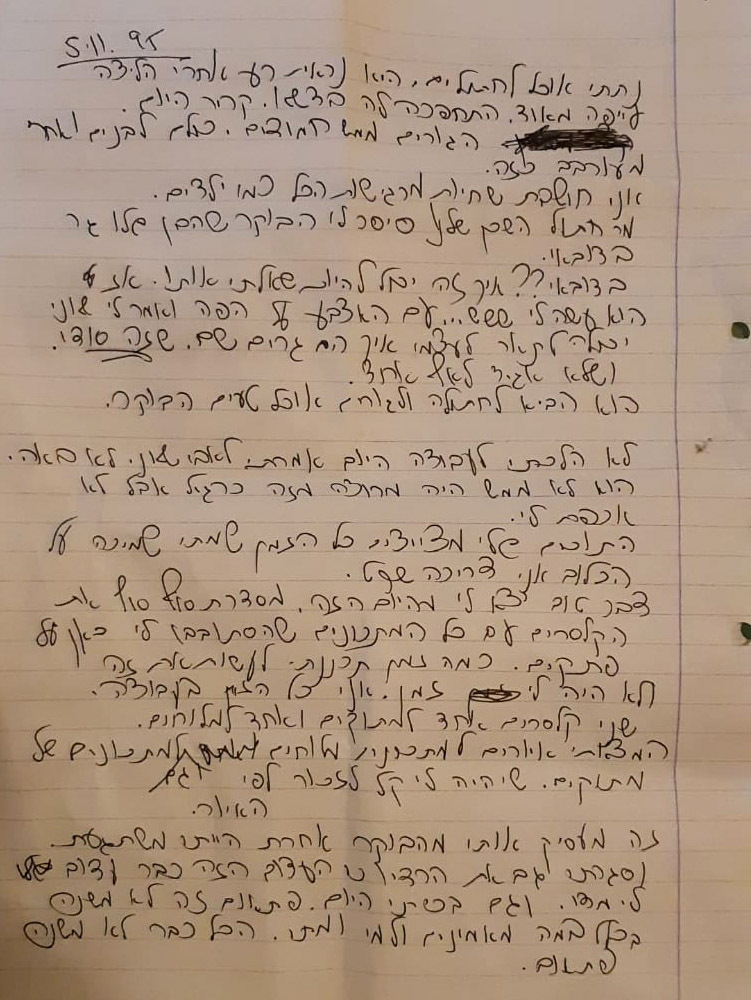
We got back from the movies yesterday with A and M at the Gat Movie Theater. It was fun at the movies. To think it all happened while we were watching a movie. Afterwards we were speechless, from the shock. I didn’t talk to them today. I didn’t feel like it.
The binders are making me want to host. Maybe on Friday.
Maybe I should print everything? Does handwriting still look good? I don’t know.
I haven’t talked to anyone except my mom. I haven’t yet talked to my dad about this. I am not brave enough. I already know what he will say and I don’t want to hear it.
What’s politics got to do with me at all, I’m not political.
I’m copying recipes instead of going to lay flowers or candles in memory.
I feel a pang of conscience.
I don’t want to go to work tomorrow, I want to continue with the recipes. It’s addictive.
N knocks on the door, I missed him. He went to work today.
25 years later: Tamari Slonim Liebs (50), mother of three, facilitates vision board workshops, works with visuals and content on social media, and authors the blog “tamari and me.”
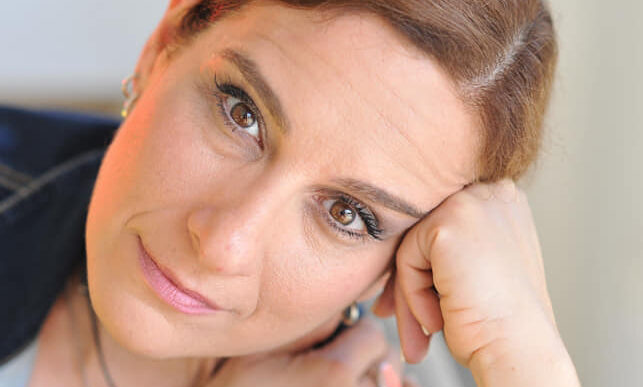
"I noticed that in all this text, I did not use the word 'murder' nor the word 'Rabin.' I transcribed everything without talking about what happened. The murder was a very big upheaval for me. I ask myself, if they had not murdered him, would I have written this text at all? I don’t think so, because I have never written about demonstrations of any kind, and at that time I wrote almost nothing about anything. I don't really have an answer for that.”
Arieh Lipo
In 1995, Lipo was 23 years old, living in the Jewish settlement in Hebron and studying at the Hesder Yeshiva in Ramat Gan. He wrote the following letter about a week before the murder to members of the "other side" – members of the leftist youth movement Noar Meretz. He arrived at the peace rally on November 4, 1995 with the letter in his pocket, but after learning that Rabin had been assassinated, he did not know who to deliver it to.
Cheshvan 5776
From Arieh Lipo, Ramat Gan Yeshiva, 29 HaEtzel
To my brothers from Noar Meretz,
I’ve been thinking for a long time about how we maintain the connection that exists between us.
I ask myself if the time has come when we can listen to each other, where each side can try to find the truth in the other’s perspective. If it’s possible, despite the turbulent and hostile reality, to strive for the creation of brotherhood and unity between us with mutual understanding.
And to try, instead of feuding, to listen to each other and together build a vision that will unite and include the truth that exists in both camps.
Because I believe that every ideological movement in the people of Israel, which brings together young people, idealists, must have a certain truth in it. If there is still disagreement between us, it is because every person is limited and does not see the justice and truth and goodness in the other camp. My eyes constantly turned toward peace between the two camps, and I pray that this peace will come before the civil war escalates.
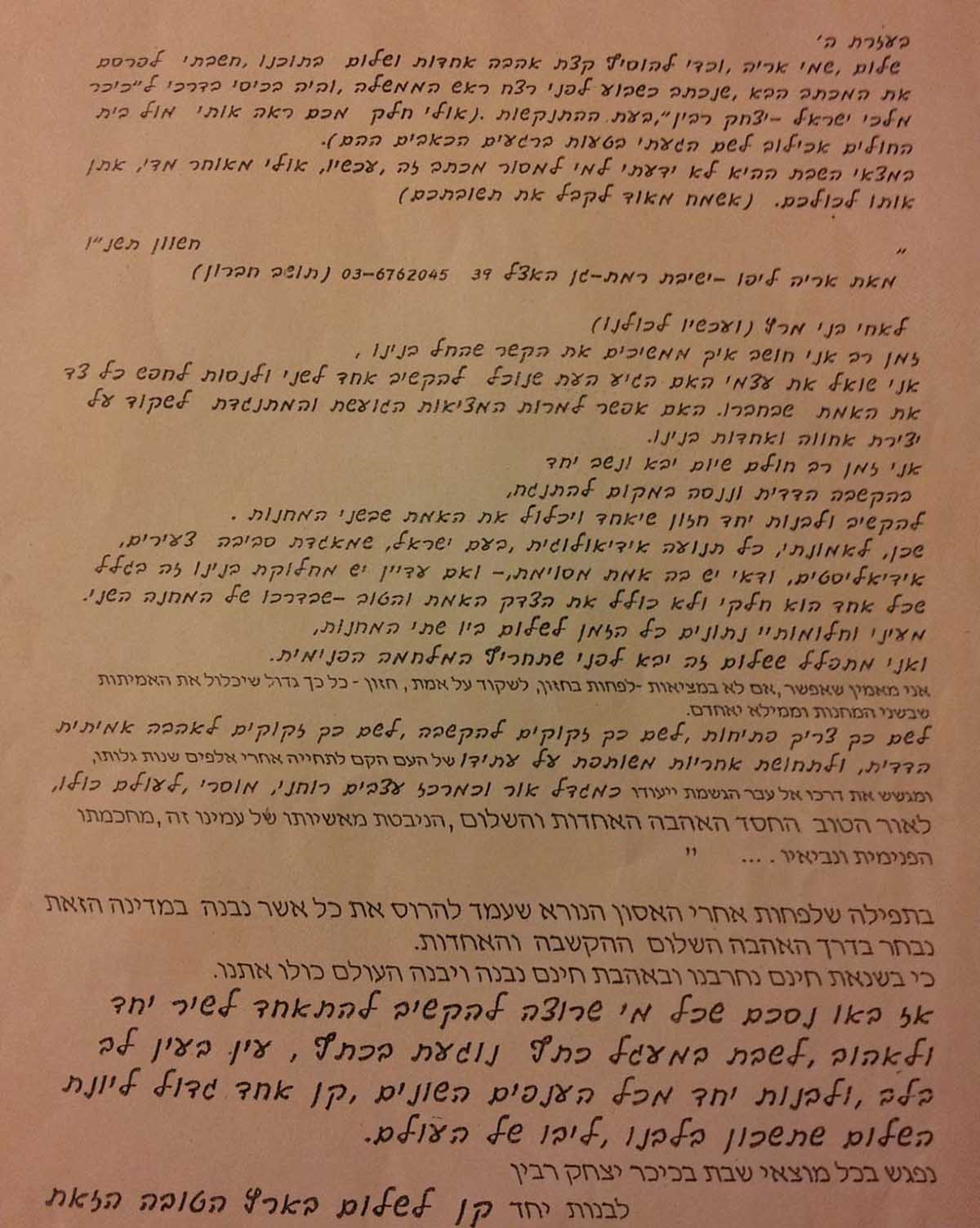
I believe that it is possible, if not in reality – at least in vision, to strive for truth, a vision – so great that it will include the truths in the two camps and unite them.
This requires openness, this requires listening, this requires mutual true love, and a shared sense of responsibility for the future of the Jewish people after two thousand years of exile, groping its way toward fulfilling its destiny as a lighthouse and a spiritual and moral nerve center to the whole world, in the light of goodness, grace, love, unity and peace…
After the assassination, Lipo hung this letter on the noticeboard of the yeshiva where he studied, and added the following sentences:
I pray that after the terrible disaster that almost destroyed everything that’s been built in this country, we will choose the path of peace, listening and unity.
Because in baseless hate we have been destroyed, and in baseless love we will build, and the whole world will be built with us.
So let's conclude that anyone who wants to listen, to unite, to sing together and to love, to sit in a circle, shoulder to shoulder, eye to eye, heart to heart, will come together to build a great nest, made up of all the different branches, for the dove of peace that will dwell in our hearts and in the heart of the world.
We will meet every Saturday night in Rabin Square.
To build together a nest of peace in this good land.
25 years later: Arieh Lipo (47) is a rabbi, and father of seven. He works in bio-feedback, is an educator, and studies at the “Drishat Tzion” program.
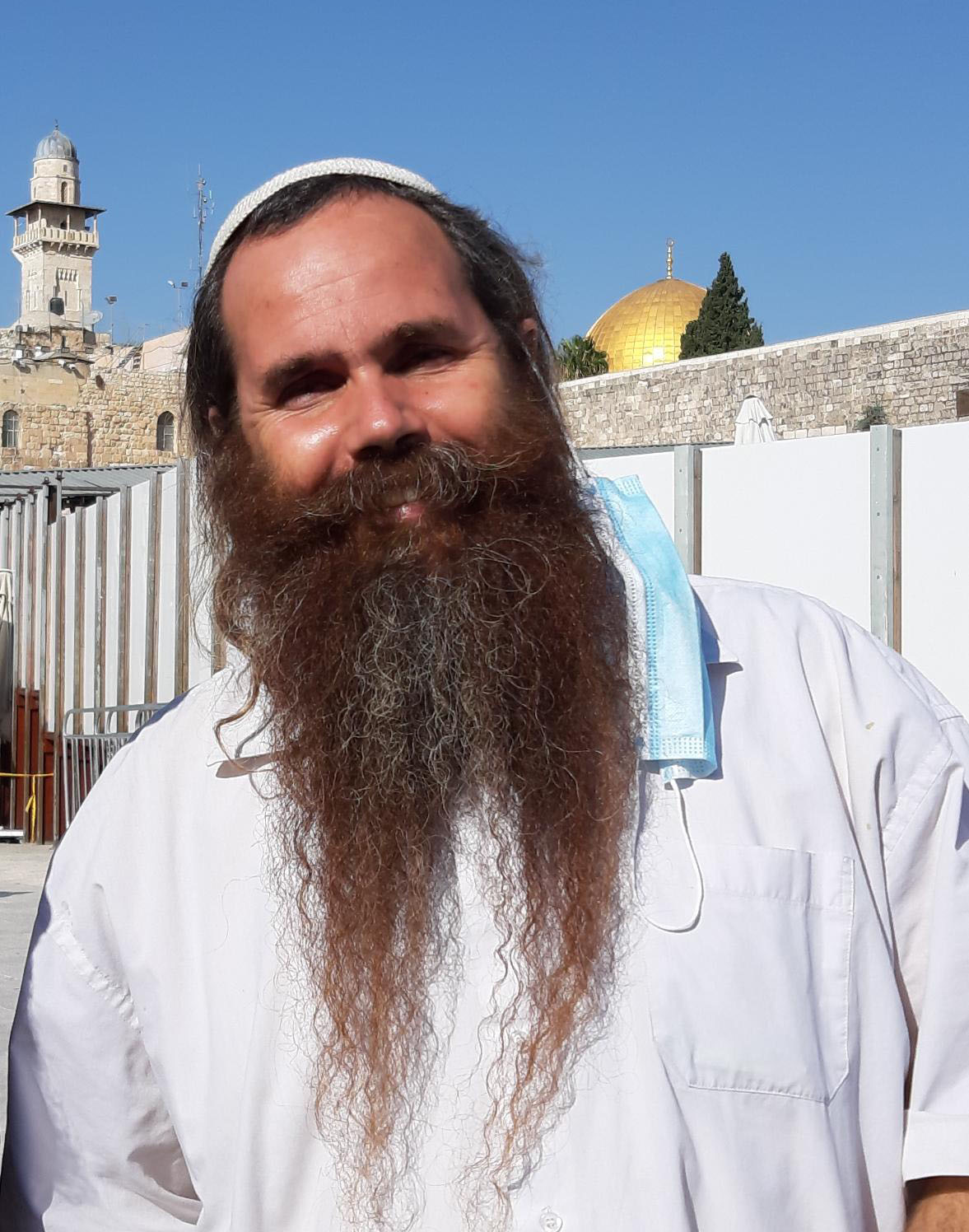
"I think the letter is foundational and true. It must not be superficial. The world contains goodness, truth and falsehood mixed together. Wisdom means learning and listening, instead of conflict and arguing. I believe it is also possible to connect to a shared vision of unity. My conclusion is not to miss opportunities for dialogue, connection, breaking down divisions and stigmas, and initiating activities of unity, of opening the heart and baseless love. Because sometimes it can be too late.”
Yael Teltsh
In 1995, Teltsh was 47 years old and a kindergarten teacher in Kiryat Tivon. She wrote the following letter to her daughter, Noga, for her 15th birthday on the day after the murder.
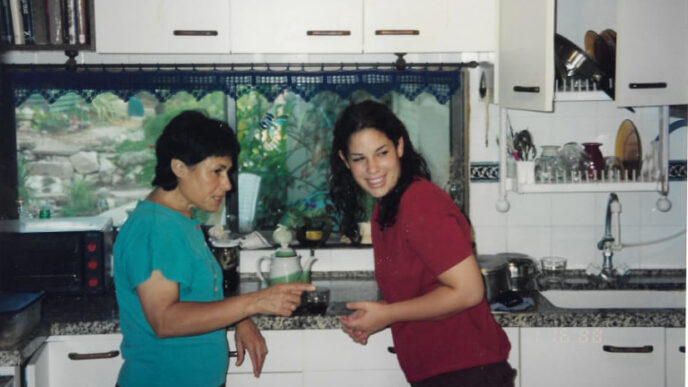
Nov. 5, 1995
To Noga,
Today you are fifteen!
On your birthday, you’re going through a hard experience. You will be in Jerusalem and visit the coffin of Yitzhak Rabin, accompanied by your father and brother. You cried yesterday, you are crying today and I hope that tomorrow your tears will dry up, not because you forget, but rather that starting tomorrow, my hopes,the hopes of a mother, will be fulfilled.
I wanted you to be born into a whole world that is all peace, I wanted you to be able to look up to your two brothers, both combat soldiers, without constant fear because of the danger they are in.
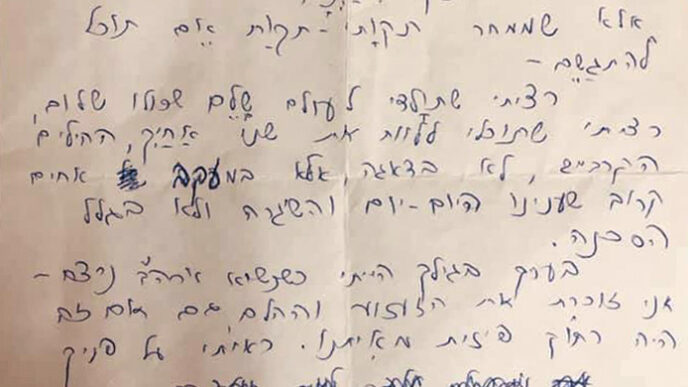
I was about your age when the President of the United States was murdered. I remember the uproar and shock, even if it was physically far from us. I recognized on your face the bewilderment that I felt then.
I am proud of your tears, because that is how I would want you to react, with all your heart.
For your birthday, I wish that in spite of it all, you will hope, like I do, for better days, and that you will work with all your power towards that end.
With love,
Mom
25 years later: Yael Teltsh (72), mother of three and grandmother of six.
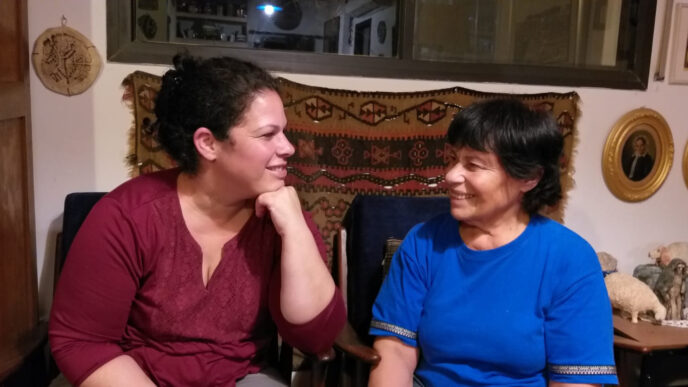
"I did not remember this text until now, and was moved to read it. That year, I was in psychodrama training at Oranim Seminary, and there was a workshop on Sunday morning, after the night of the murder. There was a discussion about the murder, and the teacher conducted an exercise in which she asked everyone to choose someone to write a letter to. Since Noga’s birthday was on the very same day, November 5, I chose to write her the letter. A very personal letter. I remember it, it evokes crying and feelings of loss and helplessness about the situation. They took a bit of hope away from us."






